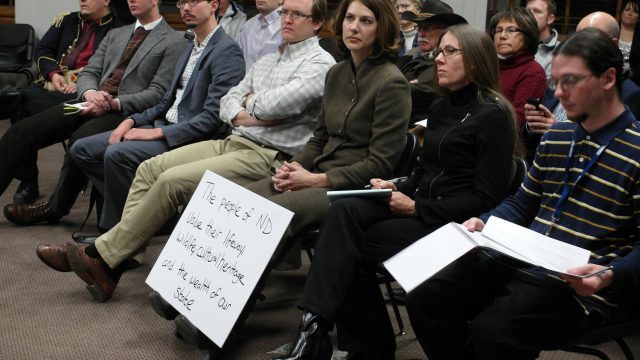North Dakota Considering Limitations On Who Can Comment Officially At Oil/Gas Hearings

Current North Dakota state law allows “interested parties” to comment, in person and in writing, at hearings before the North Dakota Industrial Commission which regulates oil and gas development in the state.
But “interested parties” isn’t defined in the law. Now a proposal coming from the Department of Mineral Resources would provide a definition which would narrow who could comment.
Per Amy Dalrymple, the new definition states: “Interested party means an individual or number of individuals that have a property ownership or management interest in or adjacent to the subject matter.”
Democratic gubernatorial candidate Marvin Nelson likens that to the disenfranchisement of voters:
Marvin Nelson, a state legislator from Rolla, said he opposes a proposal under consideration that would define an “interested party” in oil and gas statutes as a landowner or property manager.
“Years ago, people were required to own land to vote, and we thought those days were past,” Nelson said. “Now, the Industrial Commission says people can’t even comment without owning land.”
“To me, it seems like such a huge limitation on the public,” Nelson adds.
That smacks of hyperbole to me, though the Industrial Commission – made up of Governor Jack Dalrymple, Agriculture Commissioner Doug Goehring, and Attorney General Wayne Stenehjem – should tread carefully on this issue.
And it seems they will. “I favor a wide and robust public involvement when the government is taking any kind of action,” Stenehjem is quoted as saying in the article.
That makes sense, but there is a very real problem that this rule change is attempting to address. Namely, hearings over things like pipelines and drilling permits getting clogged with people whose only interest is in blocking oil and gas development. Activists, often from outside of North Dakota and funded by political groups, sometimes show up en masse slowing these proceedings down and costing all involved – from the oil companies to the land owners to the taxpayers – more time and money.
I’m all for public involvement in the process, but it seems to me that the proper place for that kind of activism is at the Legislature where laws could be passed to block oil and gas development. Not protesting at hearings over specific projects.
Still, I’m not sure this particular change is the right way to go. I’d support a narrowing of involvement, but this may well be too narrow.




